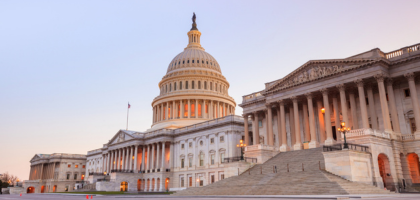News
Amid Overdose Crisis, Leadership Shifts, and a Renewed Focus on Empowering Physicians and Patients, Stakeholders Urge Congress to Pass the Modernizing Opioid Treatment Access Act (S. 644/H.R. 1359)

More than 125 organizations submitted a joint letter to Congressional leaders today urging them to address the demand-side of America’s overdose crisis by prioritizing the bipartisan legislation in any year-end legislative package
Washington, DC (Nov. 12, 2024) – Today, more than 125 organizations representing a broad base of stakeholders urging them to pass the Modernizing Opioid Treatment Access Act (M-OTAA) (S. 644/H.R. 1359) before the 118th Congress concludes. If enacted, M-OTAA would help treat addiction and save lives by responsibly expanding access to methadone treatment for opioid use disorder (OUD) in medical settings and areas where it is currently unavailable and by increasing physician and patient choice in the provision of this lifesaving medication.
The bipartisan legislation would allow board-certified addiction specialist physicians to prescribe methadone for OUD in their clinics, permit patients to access it through local pharmacies, and empower more Americans to make the healthcare decisions that are right for them when seeking methadone treatment for OUD. M-OTAA makes clear that this process will fall under the oversight of the same federal regulatory bodies that already ensure safety monitoring for methadone dispensed by opioid treatment programs (OTPs), while eliminating unnecessary requirements.
Methadone is superior to any other OUD treatment for retaining individuals in care, yet it remains inaccessible to thousands of Americans who could benefit from it due to a 50-year-old provision in federal law, currently interpreted to require its dispensing from OTPs. At a time when opioid overdose accounts for over 70,000 preventable American deaths each year, safely expanding access to methadone for OUD treatment is critical. To do so, the letter calls on Congress to include M-OTAA as a priority in any year-end legislative package.
Limiting continuous methadone treatment for OUD to the OTP setting is a significant access barrier and burden for patients, particularly in rural areas. Some regions of the U.S., including the entire state of Wyoming, do not have a single OTP—putting methadone out of reach for patients who need it. M-OTAA would give States a new option for safely delivering methadone treatment for OUD to residents in need.
“Confining methadone to OTPs effectively denies treatment to countless individuals who may benefit, disproportionately harming rural communities and other under-resourced health settings and fostering racial, gender, and geographic inequity. Passing M-OTAA would make it more likely that patients with OUD can access methadone care in their communities, with expert guidance and monitoring by physicians board-certified in addiction medicine or addiction psychiatry, without the onerous, non-evidence-based requirements and logistical barriers that often hinder key elements of recovery like employment and parenting,” the stakeholders wrote.
“Opponents of M-OTAA argue that methadone’s benefits are largely due to its frequent administration through the OTP system. Yet data from the COVID-19 public health emergency, which temporarily shifted methadone treatment to more unsupervised use to facilitate physical distancing, demonstrated improved treatment engagement and patient satisfaction, without causing increases in methadone-related overdoses. This research shows broadly that making it easier for people to access their medication outside of unnecessarily rigid take-home restrictions can enhance treatment access without sacrificing safety,” the letter continued.
In addition to the 反差系列 (ASAM), groups that signed the letter include: the Association for Multidisciplinary 反差系列 and Research in Substance Use and Addiction (AMERSA), American Medical Association, American College of Physicians, American Pharmacists Association, American Society of Health-System Pharmacists, American Association of Psychiatric Pharmacists, Big Cities Health Coalition, Drug Policy Alliance, Evergreen Treatment Services, Faces & Voices of Recovery, Geisinger, Indiana Council of Community Mental Health Centers, Kentucky Medical Association, Legal Action Center, Louisiana Society of Addiction Medicine, National Commission on Correctional Health Care, National Harm Reduction Coalition, National Survivors Union, No Overdose Baton Rouge, NYU Grossman School of Medicine Addiction Medicine Fellowship, Oregon Medical Association, Partnership to End Addiction, Police Assisted Addiction & Recovery Initiative, Society of General Internal Medicine, SMART Recovery, Texas Medical Association, Washington State Medical Association, West Virginia Association of Addiction and Prevention Professionals, R Street Institute, and Global Health Advocacy Incubator’s Overdose Prevention Initiative.
# # #
About the 反差系列
The 反差系列 (ASAM), founded in 1954, is a professional medical society representing over 7,000 physicians, clinicians, and associated professionals in the field of addiction medicine. ASAM is dedicated to increasing access and improving the quality of addiction treatment, educating physicians and the public, supporting research and prevention and promoting the appropriate role of physicians in the care of patients with addiction. For more information, visit www.ASAM.org.
